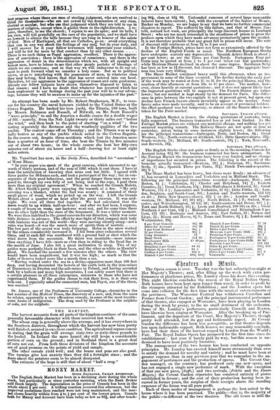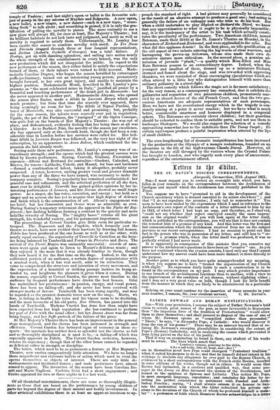tkratrts ant usir.
The Opera season is over. Tuesday was the last subscription-night at Her Majesty's Theatre ; and, after filling up the week with extra per- formances at playhouse prices, Mr. Lumley closes his doors this evening. This night likewise concludes the season of the Royal Italian Opera. Both houses have been kept open longer than usual, in order to profit by the strangers attracted by the Exhibition ; and the London opera has come into collision for the first time with the musical entertainments of the provinces. The Worcester Festival has withdrawn Castellan and Formes from Covent Garden ; and the principal instrumental performers of that theatre, also engaged at Worcester, have been playing in London during the week by proxy, to the no small detriment of the orchestra. Some of Mr. Lumley's performers, particularly Cruvelli and Reeves, have likewise been singing at Worcester. After the breaking up of Par- liament, and the departure of the Court, Her Majesty's Theatre, though pretty well attended, lost its gay and fashionable aspect. At Covent Garden the difference has been less perceptible, as that theatre depends less upon fashionable support. Both houses, we may reasonably conclude, have had their share of the harvest reaped by London from the World's Fair. The Royal Italian Opera has prospered for the first time since its establishment : last year it barely paid its way, but this season is un- derstood to have been positively lucrative. The management of the two houses has been conducted on opposite principles. Mr. Lumley has exerted himself more strenuously than ever to satisfy the demand for novelty and variety ; and he must have been at greater expense than in any previous year that we remember in the en- gagement of performers and the production of operas. Tho Covent Gar- den manager, on the contrary, has produced only one new opera, and has not engaged a single new performer of mark. With the exception of that one new piece, (Saffo,) and two revivals, (Fide& and the Flauto Magico,) the Covent Garden repertoire has consisted entirely of pieces established in favour ; and the cost of their production having been in- curred in former years, the surplus of their receipts above the standing expenses of the house was all pure profit. Each of these modes of management is perhaps the best suited to the house where it has been practised. The public—that is, the majority of the public—is different at the two theatres. The old house is still the
temple of Fashion ; and last night's opera or ballet is the favourite sub- ject of gossip in the gay saloons of Mayfair and Belgravia. A new opera, a new ballet, a new singer, a new dancer—each is a new topic, " some- thing fresh " to talk about ; and something is gained, if it is only the gra- tification of pulling the novelty to pieces. The mere curiosity to see a new piece will always fill, for once at least, Her Majesty's Theatre ; but its brilliant habitues do not lack taste and judgment, and merit as well as novelty is required to satisfy them. Unfortunately, Mr. Lumley has been unable this season to combine novelty with merit. Is 7're Nome and Florinda dragged through three or four languid representations, and Zerlina (Auber's Corbeille d' Oranges) was a total failure. I? Frodigo, got up with day:ding splendour, and calling into action nearly the whole strength of the establishment in every branch, was the only new production which did not disappoint the public. In regard to the new performers of the season, they either failed to satisfy the expectations formed of them, or their talents were turned to little account Made- moiselle Caroline Duprez, who began the season heralded by extravagant puffs-preliminary, turned out an interesting young person, prematurely brought forward, to her own great injury, and unable to maintain the highest position. Mademoiselle Monti, described in Mr. Lumley's pro- gramme as "the most celebrated mime in Italy," justified all praise by a beautiful and touching performance of the dumb girl in Masaniello : but she never appeared in another part. Mademoiselle Alaymo, who opened the season after Easter, made a debfit in Luerezia Borgia which gave much promise ; but from that time she scarcely ever appeared, there being seemingly no room for her. The debut of Signor Pardini, the tenor of Hasaniello, was also successful and promising; but., probably for the same reason, his talents were scarcely ever put in requisition. Ugalde, the pet of the Parisians, the "rossignol " of the Opera Comique, was quite lost on the boards.of Her Majesty's Theatre : she was out of place, and disheartened, evidently feeling that her being there at all was a blunder. As to Barbieri Nini, the novelty of the season par excellence, she has appeared only at the eleventh hour, though she had been a con- siderable time in London before her services were called for. Her bril- liant debftt in Luerezia Borgia was followed, on the very last night of the subscription, by an appearance in Anna Bolena, which confirmed the im- pression she had already made. Setting aside these new performers, Mr. Lumley's company was of ex- traordinary strength ; and the operas which had the greatest success were filled by known performers. Sontag, Cruvelli, Giuliani, Fiorentini, for sopranos—Alboni and Bertrand for contraltos—Gardoni, Calzolari, and Reeves, for tenors—Liblache, Coletti, and Massol, for bass and baritones —formed a combination of talent, taking it altogether, probably never surpassed. A tenor, however, uniting greater vocal and greater dramatic power than any of the three we have named, was necessary to make the company complete. Sontag's popularity has remained undiminished : her graceful ease and refinement, and the artistical perfection of all she does, must ever be delightful. Cruvelli has gained golden opinions by her in- teresting performance of Leonora, and her Norma showed no small tragic power. As a singer, she has voice, execution, and energy ; but both as a singer and an actress she has yet to acquire that high degree of delicacy and finish which is the consummation of art. Alboni's engagement was too brief; but her Cenerentola and Orsini were as admirable as ever. During Sontag's temporary retirement she appeared in the Figlia del Beg- gement° ; her dashing boldness forming a contrast to the quieter and more ladylike vivacity of Sontag. The "mighty basso " retains all his giant strength, his wonderful variety, and his paramount importance. The proceedings at Covent Garden give little room for particular re- trospect. The Huguenots and the Poophite, which formerly cost the theatre so much, have now yielded their harvests by drawing full houses. _Mile& has been produced at the one house as well as at the other, with nearly equal success ; the superiority of Cruvelli to Castellan as the hero- ine being balanced by Tamberlikand Formes in Florestan and Rocco. The revival of the Benito Magico was eminently successful : crowds of ama- teurs went again and again to listen to Mozart's delicious music ; and they enjoyed it the more that it was already familiar to them, though they now heard it for the first time on the stage. Indeed, to the more cultivated portion of an audience, a certain degree of acquaintance with a musical work, when it has real merit, adds to its attraction. They come to comprehend the structure and intention of every movement, and the expectation of a beautiful or striking passage insures its being at- tended to, and heightens the pleasure it gives when it comes. During the season, especially at Covent Garden, the pieces most familiar to the audience by frequent performance have drawn the best houses. Grisi has maintained her preeminence : in passion, energy, and vocal power, there has been no falling-off; and she never has been received with stronger marks of favour. Tamberlik has been rising rapidly, and may be regarded as the greatest dramatic tenor now on the stage. Mario, we fear, is failing in health ; his voice and his vigour seem to be declining, and the most favourite of his old parts, Don Ottaoio, has passed into the hands of Tamberlik. Madame Viardot has done less than might have been expected from her high reputation : she has continued to perform her part of Fides with the usual effect ; but her Donna Anna was far from being happy, and her Safe partook of the failure of the piece. At Her Majesty's Theatre there has been an improvement in the general stage management, and the chorus has been -increased in strength and efficiency. Covent Garden has betrayed signs of economy in these re- spects : the spectacle has neither been so splendid nor the chorus so full and so thoroughly disciplined as it used to be,—a falling-off which was especially apparent in Fide,lio. The Covent Garden orchestra, however, retains its supremacy ; though that of the other house cannot be regarded as deficient either in strength or discipline. The ballet, which used to be so prominent a feature at Her Majesty's Theatre, now excites comparatively little attention. We have no longer those magnificent and elaborate ballets of action which used to rival the. operas themselves as objects of interest. There are only little di- vertissements and incidental dances ; and male performers have almost ceased to appear. The favourites of the season have been Carolina Ro- sati and Marie Taglioni. Carlotta Grisi had a short engagement ; and Cerito appeared for two or three nights in ti.e last week.



























 Previous page
Previous page